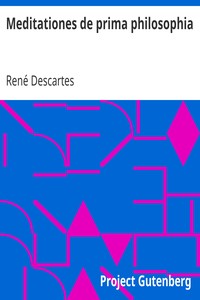Meditationes de prima philosophia
Author: René Descartes
Bookshelves: Banned Books from Anne Haight's list, Philosophy & Ethics, Religion/Spirituality/Paranormal, Category: Philosophy & Ethics

Summary
"Meditationes de prima philosophia" by René Descartes is a philosophical treatise written in the early 17th century. The work lays the groundwork for modern Western philosophy, focusing on the nature of existence, the existence of God, and the distinction between the mind and body. Descartes explores his thoughts through a series of meditations, ultimately seeking fundamental truths about reality and knowledge. At the start of "Meditationes de prima philosophia," Descartes introduces his philosophical methodology, advocating for a radical doubt that questions everything previously accepted as true. He asserts the importance of discarding all beliefs that are even slightly uncertain to rebuild knowledge on solid foundations. This leads him to his famous conclusion, "Cogito, ergo sum" (I think, therefore I am), illustrating that the very act of doubting or thinking confirms his existence. Descartes also briefly sets the stage for his discussions on the existence of God and the distinction between the mind and body, establishing a critical framework for the subsequent arguments he will elaborate on in the following meditations. (This is an automatically generated summary.)
 LibraryManager
LibraryManager